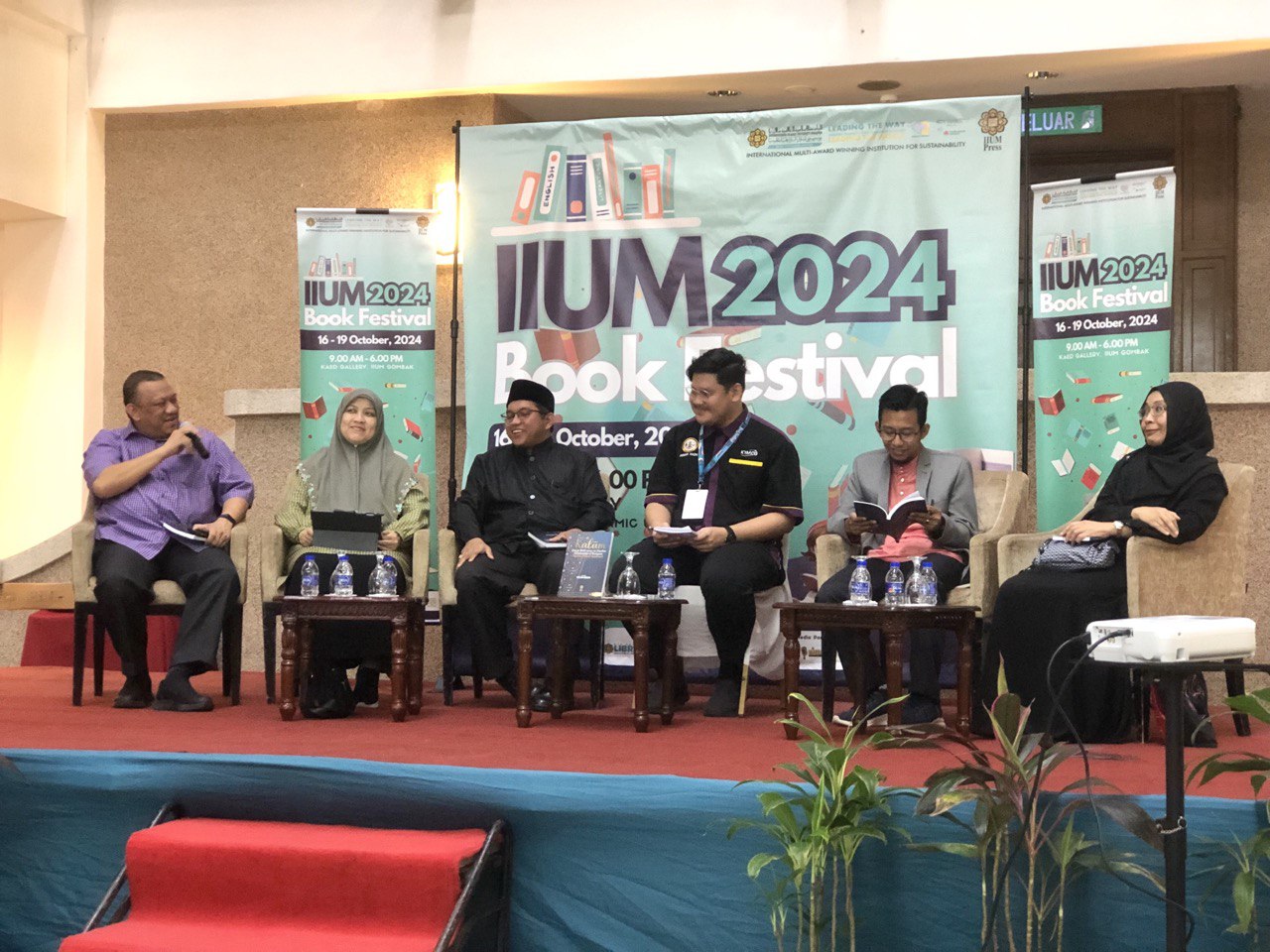By, Nor Asfarina Syakirin
Gombak,18 October 2024: IIUM Press organised a book talk featuring distinguished guests from various fields.
The discussion was on 18 October 2024 when IIUM Press invited guests named the Deputy Deans of Abdulhamid Abusulayman Kulliyyah of Islamic Revealed Knowledge and Human Sciences of the International Islamic University Malaysia (IIUM), Assoc. Prof. Dr. Haslina Ibrahim and Assoc. Prof Dr. Mohd Noh Bin Abdul Jalil; Head of Da’wah and Islamic Management, Faculty of leadership and Management, Universiti Sains Islam Malaysia, Dr. Mohd Faridh Hafez bin Mhd Omar; Senior Lecturer of Department of Government and Civilization Studies, University Putra Malaysia, Dr. Arifah binti Ab Majid and, Senior Lecturer at the Research Centre for Theology and Philosophy, Faculty of Islamic Studies, the National University of Malaysia (UKM), Dr. Wan Haslan bin Khairuddin.
During the discussion, the moderator, Ammar Firdaus, asked the first panellist Assoc. Prof. Dr Mohd Noh about the two greatest scholars in the Malay Archipelago, Nur al-Din al-Raniri and Abd al-Rauf al-Sinkili and their main motivations in writing the works of the study of religion and how their works differ from the works of early muslim scholars.
Assoc. Prof. Dr. Mohd Noh defined that both scholars did not come from the same culture, Abd al-Rauf al-Sinkili was a scholar from the Malay Archipelago while Nur al-Din al-Raniri was a scholar from India. The context that was written was based on what people needed during the time especially there was huge discourse about Islamic practices among Muslims.
He also added that due to the influence from India there was a lot of competition during those days and that made al-Raniri use a confrontational approach while al-Sinkili from the Malay Archipelago has a peaceful life experience that does not use the confrontational approach.
The moderator also asked the second panellist, Assoc. Prof. Dr. Haslina, regarding the influence of historical aspects to kalam and the relevance of kalam to modern ethics.
“Whether we like it or not, we need to acknowledge that the encounter between Christians and Muslims had contributed indirectly to more discourse especially on religion among the Muslim scholars,” said Assoc. Prof. Dr. Haslina. The encounter between Muslims and Christians contributed significantly to the discourse of comparative religion whereby Muslims needed the logic to engage with Christians in order to correct the Christian understanding towards Islam.
Assoc. Prof. Dr. Haslina also highlighted that the most beneficial tool from kalam is logic. In modern society, the logical reason was the most important tool in order to convince people about Islam.
As for the third panellist, Dr. Wan Haslan explained the group that the study of kalam is the one who has the capability to learn in depth about aqidah and can involve themselves in intellectual debates that can defend the religion using facts. He also mentioned that students of usuluddin and comparative religion were chosen to study both subjects and the student needed to learn everything about philosophy, logic, theology and ideology.
Dr. Mohd Faridh as one of the panellists also discussed the name of God in Muslim and Christian traditions. He also added that Muslims do not rely on other historical background but in the revelation itself, where God is addressed as Allah.
“Why has this issue become polemic throughout 2011 until 2015 even up to 2018, you can see the issue is not pointed out by the scholars, even not by kalam scholars, not by the students of usuluddin, but it has just started being mentioned by politicians,” he noted. He also reminded that the scholars were not supposed to take a step back from politics but needed to give a proper understanding to them.
In the final discussion with panellist, Dr. Arifah who highlighted interrogation towards perfection in the interreligious dialogue model. The main goal of interreligious dialogue is the recognition of truth. She also explained the rationality of interreligious dialogue and the method to reach grassroots in the interreligious dialogue.
The IIUM book festival 2024 was organised by IIUM Press from 16 October to 19 October at the Kulliyyah of Architecture & Environmental Design of the International Islamic University Malaysia (IIUM), Gombak.***
